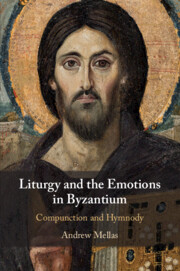Book contents
- Liturgy and the Emotions in Byzantium
- Liturgy and the Emotions in Byzantium
- Copyright page
- Dedication
- Contents
- Figures
- Acknowledgements
- Abbreviations
- Chapter 1 Introduction
- Chapter 2 The Liturgical World of Compunction
- Chapter 3 Romanos the Melodist
- Chapter 4 Andrew of Crete
- Chapter 5 Kassia
- Conclusion
- Glossary
- Bibliography
- Index
Chapter 5 - Kassia
Published online by Cambridge University Press: 04 July 2020
- Liturgy and the Emotions in Byzantium
- Liturgy and the Emotions in Byzantium
- Copyright page
- Dedication
- Contents
- Figures
- Acknowledgements
- Abbreviations
- Chapter 1 Introduction
- Chapter 2 The Liturgical World of Compunction
- Chapter 3 Romanos the Melodist
- Chapter 4 Andrew of Crete
- Chapter 5 Kassia
- Conclusion
- Glossary
- Bibliography
- Index
Summary
This chapter moves to ninth-century Byzantium and the hymnographer Kassia, who is the only known female author of hymns appearing in the liturgical books of the Byzantine tradition. Exploring the liturgical performance of Kassia’s hymn On the Sinful Woman during Holy Week, this chapter examines the genre of this hymn (sticheron idiomelon) and its manuscript tradition. The tears of Kassia’s protagonist and how they evoke the mystery of compunction and repentance in Byzantium are investigated. On the Sinful Woman was chanted a few days before Christ’s Passion, evoking the existential abyss created by the absence of the divine from the life of the faithful and unveiling how tears of compunction could bridge this chasm. This chapter concludes with a few brief remarks on the sacred music of Kassia’s hymn and reflections on the relationship between chant and compunction.
Keywords
- Type
- Chapter
- Information
- Liturgy and the Emotions in ByzantiumCompunction and Hymnody, pp. 141 - 168Publisher: Cambridge University PressPrint publication year: 2020

